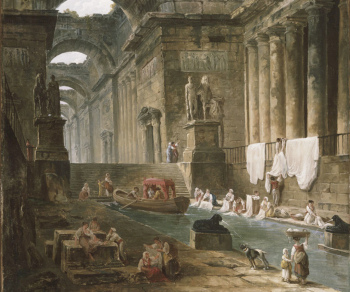It cannot be denied that the above, and other, causes of degradation spread with the diffusion of the Greek race and the language. Antioch and Alexandria became almost worse than Athens and Corinth. But the very diffusion and development of this corruption was preparing the way, because it showed the necessity for the interposition of a Gospel. It also showed the necessity of Rome's empire in order to enable the spread of Jesus' message to the entire known world.
Such was the civilization and corruption connected with the spread of the Greek language when the Roman power approached to the eastern parts of the Mediterranean Sea. For some centuries this irresistible force had been gathering strength on the western side of the Apennines. Gradually, but surely, and with ever-increasing rapidity, it made to itself a wider space, northward into Etruria, southward into Campania. Rome passed beyond its Italian boundaries.
Six hundred years after the building of Rome, the Roman eagle had seized on Africa at the point of Carthage, and Greece at the Isthmus of Corinth, and had turned its eye towards the East. Before the birth of our Savior, all those coasts, from Ephesus to Tarsus and Antioch, and round by the Holy Land to Alexandria and Cyrene, were tributary to Rome. It was the start of a mighty empire.

Roman traits
We have to describe in a few words the characteristics of this new dominion, which would become the Roman Empire, and to point out its providential connection with the spread and consolidation of the Church.
In the first place, this dominion was not a pervading influence exerted by a restless and intellectual people, but it was the grasping power of an external government. The idea of law had grown up with the growth of Rome and wherever it went it carried it with them. Wherever Roman armies were marching or encamping, there always attended them, like a mysterious presence, the spirit of the city of Rome. Universal conquest and permanent occupation were the ends at which they aimed. Strength and organization were the characteristics of their sway.
Greek science and commerce were wafted, by irregular winds, from coast to coast, and now we follow the advance of legions, governors, and judges along the Roman Roads. They pursued their undeviating course over plains and mountains, and bound Rome to the furthest extremities of the provinces.
Spirit of the age
There is no better way of obtaining a clear view of the features and a correct idea of the spirit of the Roman age and empire than by considering the material works which still remain as its imperishable monuments. Whether undertaken by the hands of the government, or for the ostentation of private luxury, they were marked by vast extent and accomplished at an enormous expenditure.
The gigantic roads of Rome's Empire have been unrivalled till the present. Solid structures of all kinds, for utility, amusement, and worship, were erected in Italy and the provinces, amphitheaters of stone, magnificent harbors, bridges, sepulchers, and temples.
The decoration of wealthy houses was celebrated by Roman poets of the day. The pomp of buildings in the cities was rivaled by astonishing villas in the country. The enormous baths, by which travelers are surprised, belong to a period somewhat later than that of Paul, but the aqueducts, which still remain in the Campagna, were some of them new when he visited Rome.
The eternal city
Of the metropolis of Rome itself, it may be enough to say, that its life is exactly embraced between its two great times of renovation, that of Augustus on the one hand, who (to use his own expression) having found it a city of brick left it a city of marble, and that of Nero on the other, when the great conflagration afforded an opportunity for a new arrangement of its streets and buildings.
These great works may be safely taken as emblems of the magnitude, strength, grandeur, and solidity of Rome's Empire. They, however, are emblems, no less, of the tyranny and cruelty which had presided over its formation, and of the general suffering which pervaded it. The statues, with which Rome and the Roman houses were profusely decorated, had been brought from plundered provinces, and many of them had swelled the triumphs of conquerors on the Capitol.
Rome's amphitheaters were built for shows of gladiators, and were the scenes of a bloody cruelty, which had been quite unknown in the licentious exhibitions of the Greek theatre. The roads, baths, harbors, aqueducts, had been constructed by slave-labor subjegated by the Roman empire. And the country villas, which the Italian traveler lingered to admire, were themselves vast establishments of slaves.